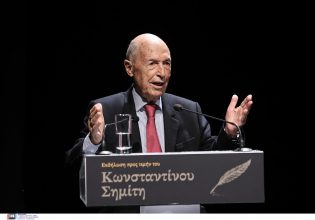Once-off allowance to counter price rises for vulnerable households
The plan provides for the payment of the allowance before Easter with the final decisions for the beneficiaries and the amount of aid to be taken in March
Against the background of the explosion of inflation and the wave of price rises that has depleted family budgets, the government is planning a new support package for the weaker income classes.
The financial staff has put on the table and is considering granting an extraordinary one-time allowance to weak households such as low-income pensioners, long-term unemployed and the beneficiaries of the Social Solidarity Income.
The plan provides for the payment of the allowance before Easter with the final decisions for the beneficiaries and the amount of aid to be taken in March when it will have clarified the landscape for the development of 2021 which is expected to move over 8.5% as well as the budget margins based on the course of the budget and the fiscal space that will have been created by the larger GDP growth.
This equation is not easy as the government has decided to keep the primary deficit this year exactly where it is described in the budget, at 1.4% of GDP. Thus, the households that are in real need of support and are most affected by the wave of price increases should be identified. In this context, the application of criteria for the selection of the beneficiaries of the “Easter allowance” is examined. Among scenarios on the table, the selection of beneficiaries will be based not only on their monthly earnings but on their total income and assets.
If this formula does not work out then the model of the Christmas allowance given to low-income retirees, people with disabilities and households receiving the Minimum Guaranteed Income will be followed and the payment of the aid will be made automatically in the bank accounts of the beneficiaries.
For the price hikes caused by the energy crisis in the electricity and gas bills, the government has mobilized monthly subsidies of 350-400 million euros. The grants are funded by the Energy Transition Fund without the need for state budget assistance. If the energy nightmare lasts beyond the first half, then the Ministry of Finance will need to finance the subsidies from the state budget.
At the same time, developments on the growth and inflation fronts are putting the Treasury on a trajectory to revise key budget figures such as growth, inflation, deficit and debt. It is certain that the new data on the course of the real economy and public finances that will be reflected in the Stability Program in April will predict higher real and nominal GDP due to the higher than forecast growth in 2021 and the higher inflation for this year, which will lead to an automatic reduction of the deficit and public debt as a percentage of GDP and will “free up space” to finance additional interventions in the economy.
The government is also betting on the recovery of tourism, with the data so far pointing to a full recovery of the pandemic losses and a return of revenues to 2019 levels and possibly higher.
- Γιατί ο καπνός από τις πυρκαγιές στην Καλιφόρνια είναι χειρότερος από άλλες μορφές ρύπανσης
- Με αγρότες από τη Βοιωτία συναντήθηκε ο Ανδρουλάκης – «Τα αιτήματά σας είναι δίκαια»
- Το παράπονο της Πάμελα Άντερσον από τον Τόμι Λι είναι πιο σοβαρό από ό,τι μπορεί να σκέφτεστε
- Eκτάκτως στο χειρουργείο ο Αρχιεπίσκοπος Αλβανίας Αναστάσιος
- Όλη η Ευρώπη θέλει τον Ράσφορντ – Η πρώτη ομάδα που απέρριψε
- Τι θα συμβεί εάν ο Τραμπ καταλάβει τη Διώρυγα του Παναμά;











